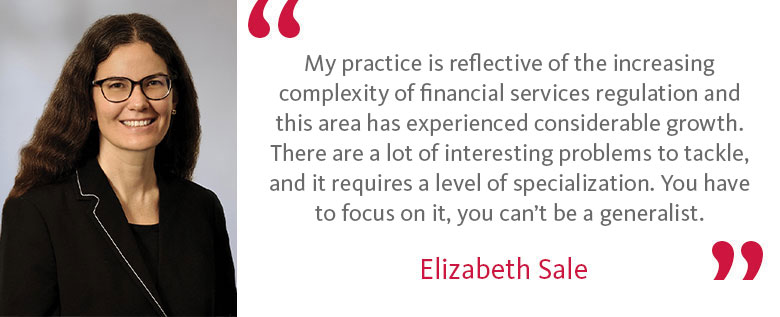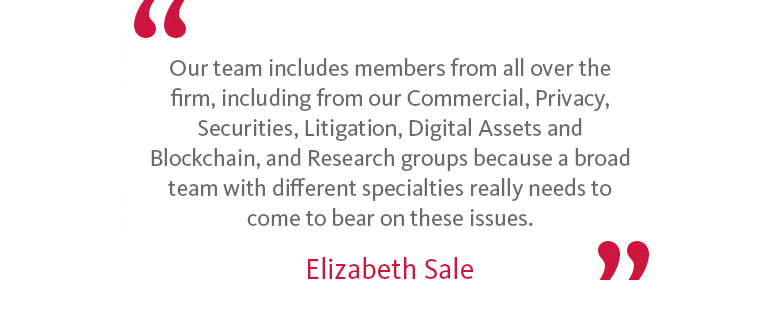Author
Partner, Financial Services, Toronto
Elizabeth Sale is a partner in Osler’s Toronto office specializing in the regulation of financial institutions and service providers including banks, insurance companies, payment industry participants, fintechs as well as participants in the emerging areas of digital assets and igaming.

Q. Your practice is quite focused on fintech, anti-money laundering, payments and work in the Digital Assets and Blockchain group at Osler. What is the focus of your practice right now?
Elizabeth: It is a broad range of work, and the focus varies day-to-day. For example, the work that came to us in connection with the Emergencies Act that was in place for a brief period of time in February of this year was very crypto focused and involved dealing with a completely novel situation. On other days I am dealing with M&A files, financial services product development, working with the Office of the Superintendent of Financial Institutions (OSFI) in connection with various applications, and other traditional financial services regulatory work that is still very much a significant part of my practice.
My practice touches on all aspects of financial services regulation, whether that is core legislation, like the Bank Act as well as regulation that applies to fintechs. I have carriage of more than 100 laws, as well as all the ancillary regulations and guidance and how they all interact. It is a mix of transactional, advisory and investigative/complaints matters, so my day might consist of advising a client on how to structure their products and services, considering whether any approvals are required in connection with a transaction involving a regulated entity for another client, and helping yet another client respond to an inquiry from a regulator.
Q: Has the nature of your practice changed dramatically in the last few years?
Elizabeth: My practice is reflective of the increasing complexity of financial services regulation and this area has experienced considerable growth. There are a lot of interesting problems to tackle, and it requires a level of specialization. You have to focus on it, you cannot be a generalist. It is such a dynamic practice — it has both commercial interest and human interest. The vast majority of us have credit cards, use banks and payment service providers so we all need to care about payments modernization, open banking, and about having access to products and services that help us buy homes, go to school, get cars – it is all very much a part of our lives.
Q: What's your philosophy for working with such a broad range of clients, from big banks to fintech and crypto clients?
Elizabeth: It is really about understanding a client's risk tolerance and how that might vary between these different types of clients, and even amongst the same type of client. But regardless of the type of client, everyone is looking for a practical solution that reflects the realities of their business and is delivered in a manner that is digestible.
Q: What are the top three questions you get from clients?
Elizabeth: “How do we get it done?” is probably the most common question I get. Clients come to me with very innovative offerings that don't always fit neatly within the existing Canadian regulatory framework. This means we have to figure out how that product might be regulated and importantly, where the regulatory risks are and whether the client can get comfortable with those risks. With emerging areas, like crypto or Ontario’s new igaming market, there is an opportunity to shape the legal and regulatory direction of that industry, which is always very exciting. Clients also reach out because they need help. For example, they might have identified that their systems are not doing what they should be, so they need someone like myself that understands the legal and compliance environment to figure out the nature and scale of the issue, the implications and how to address the issues on a go forward basis.

Q: Where do you think regulations will be headed this year in terms of payments and open banking?
Elizabeth: Open banking continues to move forward slowly, but the pace may pick up now that the federal government has reintroduced updated privacy laws that include data mobility rights. However, at this point, we are seeing industry move far faster than the regulators are on open banking. On payments, with the advent of the Retail Payments Activities Act (RPAA) we could see our payments regime open up to non-traditional players. The Bank of Canada, who will oversee the RPAA, has stated that is an opportunity for payment service providers who meet certain criteria to participate in the Real-Time Rails which will facilitate real time payments in Canada.
Q: How do you keep on top of all the developments in this area of law?
Elizabeth: We're a collaborative group. Our financial services regulatory team discusses new developments regularly, both informally and at our monthly group meeting. Our team includes members from all over the firm, including from our Commercial, Privacy, Securities, Litigation, Digital Assets and Blockchain, and Research groups because a broad team with different specialties really needs to come to bear on these issues. Together, we deliver creative legal solutions that help clients meet their business objectives and comply with changing regulatory requirements.

